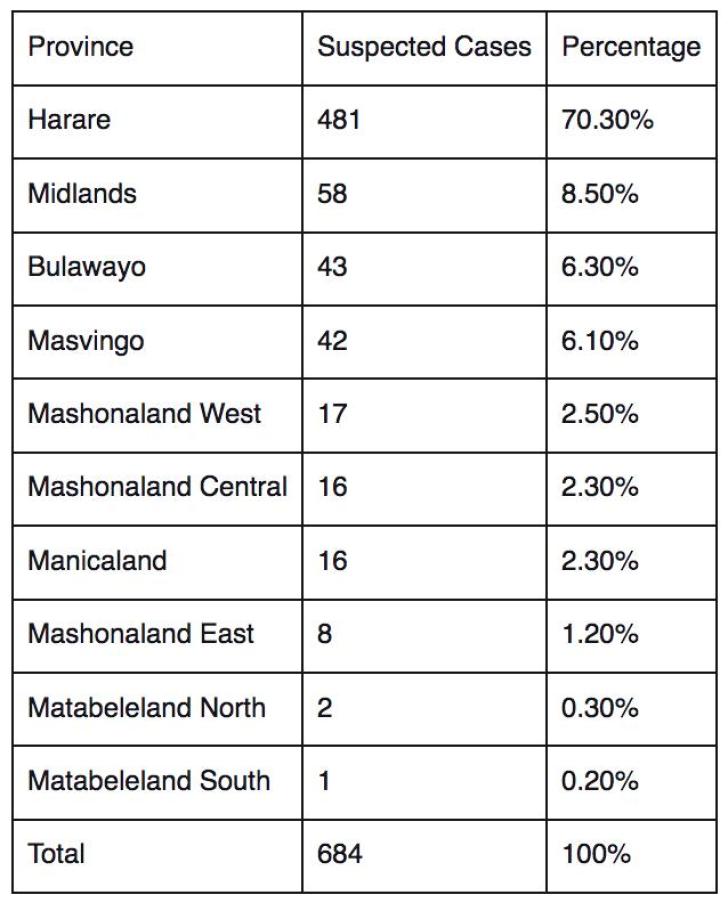News / National
Harare tops Zimbabwe's corruption list
07 Feb 2024 at 20:33hrs |
0 Views
The Zimbabwe Anti-Corruption Commission (ZACC) has revealed in its 2022 annual report that Harare constituted the highest number of suspected corruption cases, with over 70%.
In its fourth report submitted to the Minister of Justice, Legal and Parliamentary Affairs, the then ZACC Chairperson Justice Loice Matanda-Moyo stated that under the year of review, the commission received a total of 684 complaints of suspected corruption cases referred from the Investigations Department.
The report was presented in the Senate on February 6, 2024.
"Under the Combating of Corruption Programme, the newly established Selection Committee assessed a total of 684 complaints of suspected corruption cases referred from the Investigations Department. Of the total number of complaints received, Harare recorded 481 cases," the report reads.
The figures are illustrated in the table below:

The report noted that compared to 2021, there was a 38% decrease in the complaints received.
"This decrease is mainly attributed to the vigorous prevention initiatives by the Commission, which included compliance and systems review checks done in local authorities and public entities, leading to strengthened operating systems and plugging corruption loopholes, thus reducing cases of corruption," the report reads.
It added, "From the 684 cases referred to the Selection Committee, 308 were referred back to the Investigations Department for further investigation, while 147 were referred to the Zimbabwe Republic Police in terms of section 255 of the Constitution of Zimbabwe. A total of 19 cases were adjudged to be non-mandate offences and were referred to other government departments/ministries and organizations."
Adding her voice to the ZACC report in the Senate, Beitbridge Senator Tambudzani Mohadi expressed concern about the 70% of cases recorded in Harare, considering the government's efforts to curb corruption.
"The report also shows a 38% decrease in complaints received compared to 2021, indicating an improvement in compliance and plugging corruption loopholes, leading to fewer cases. Therefore, to increase efficiency in curbing corruption, I believe the following strategies can be beneficial. ZACC should actively engage in international cooperation with other anti-corruption agencies and organizations, such as the United Nations Office on Drugs and Crime (UNODC) and the African Union (AU), which have vast experiences from other countries and can adapt successful approaches to the Zimbabwean context," she said.
Mohadi explained that engaging international bodies allows ZACC to establish channels for international cooperation in investigations and mutual legal assistance.
"Corruption often transcends national borders, involving illicit financial flows, money laundering, and transnational bribery," she noted.
Furthermore, Mohadi said some corruption hotspots, such as border towns, have been neglected.
"A lot of corruption happens around these towns, and if ZACC could expand its reporting offices to these areas, it would make it more convenient for whistleblowers. Decentralisation to border towns would improve the commission's effectiveness in conducting comprehensive compliance assessments and spot checks around these institutions," she said.
Mohadi also stated that corruption not only affects the delivery of public services and misallocates resources but also decreases investor confidence.
In its fourth report submitted to the Minister of Justice, Legal and Parliamentary Affairs, the then ZACC Chairperson Justice Loice Matanda-Moyo stated that under the year of review, the commission received a total of 684 complaints of suspected corruption cases referred from the Investigations Department.
The report was presented in the Senate on February 6, 2024.
"Under the Combating of Corruption Programme, the newly established Selection Committee assessed a total of 684 complaints of suspected corruption cases referred from the Investigations Department. Of the total number of complaints received, Harare recorded 481 cases," the report reads.
The figures are illustrated in the table below:

The report noted that compared to 2021, there was a 38% decrease in the complaints received.
"This decrease is mainly attributed to the vigorous prevention initiatives by the Commission, which included compliance and systems review checks done in local authorities and public entities, leading to strengthened operating systems and plugging corruption loopholes, thus reducing cases of corruption," the report reads.
It added, "From the 684 cases referred to the Selection Committee, 308 were referred back to the Investigations Department for further investigation, while 147 were referred to the Zimbabwe Republic Police in terms of section 255 of the Constitution of Zimbabwe. A total of 19 cases were adjudged to be non-mandate offences and were referred to other government departments/ministries and organizations."
Adding her voice to the ZACC report in the Senate, Beitbridge Senator Tambudzani Mohadi expressed concern about the 70% of cases recorded in Harare, considering the government's efforts to curb corruption.
"The report also shows a 38% decrease in complaints received compared to 2021, indicating an improvement in compliance and plugging corruption loopholes, leading to fewer cases. Therefore, to increase efficiency in curbing corruption, I believe the following strategies can be beneficial. ZACC should actively engage in international cooperation with other anti-corruption agencies and organizations, such as the United Nations Office on Drugs and Crime (UNODC) and the African Union (AU), which have vast experiences from other countries and can adapt successful approaches to the Zimbabwean context," she said.
Mohadi explained that engaging international bodies allows ZACC to establish channels for international cooperation in investigations and mutual legal assistance.
"Corruption often transcends national borders, involving illicit financial flows, money laundering, and transnational bribery," she noted.
Furthermore, Mohadi said some corruption hotspots, such as border towns, have been neglected.
"A lot of corruption happens around these towns, and if ZACC could expand its reporting offices to these areas, it would make it more convenient for whistleblowers. Decentralisation to border towns would improve the commission's effectiveness in conducting comprehensive compliance assessments and spot checks around these institutions," she said.
Mohadi also stated that corruption not only affects the delivery of public services and misallocates resources but also decreases investor confidence.
Source - cite
Join the discussion
Loading comments…




























